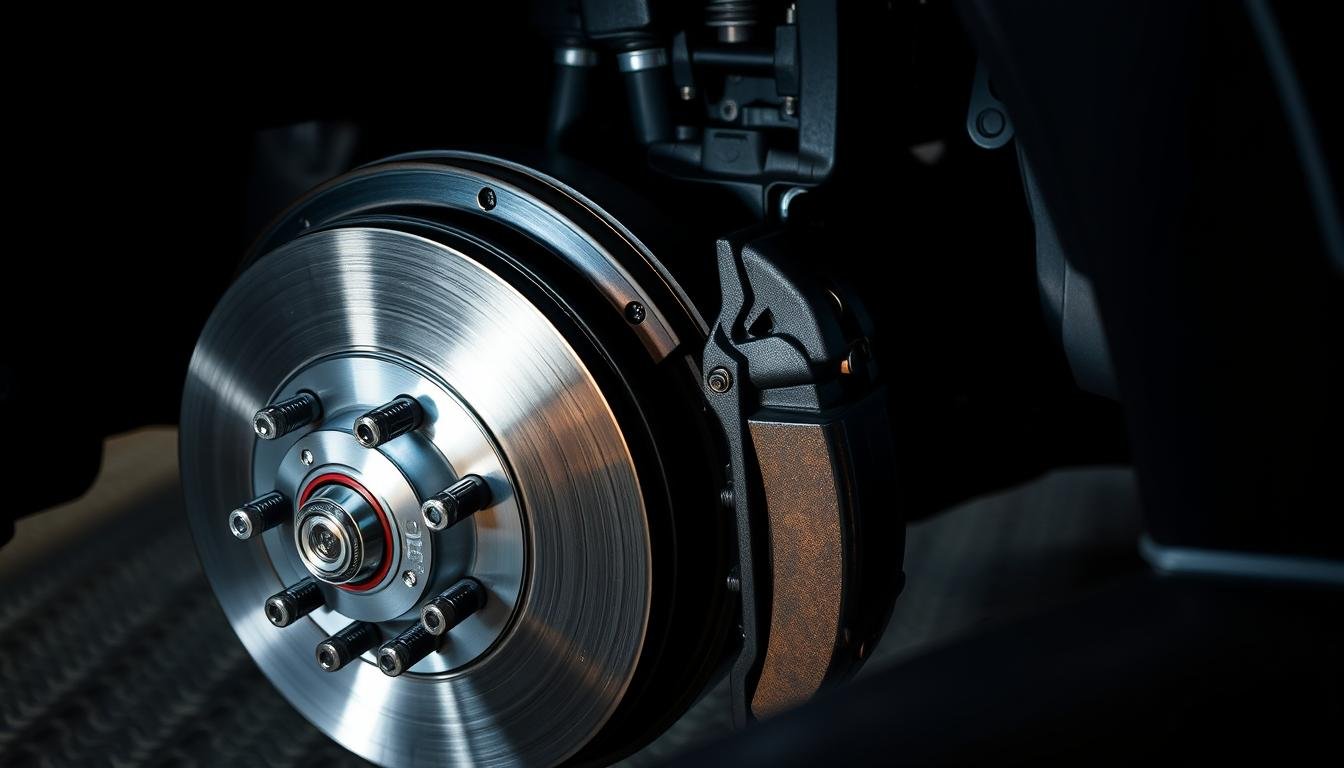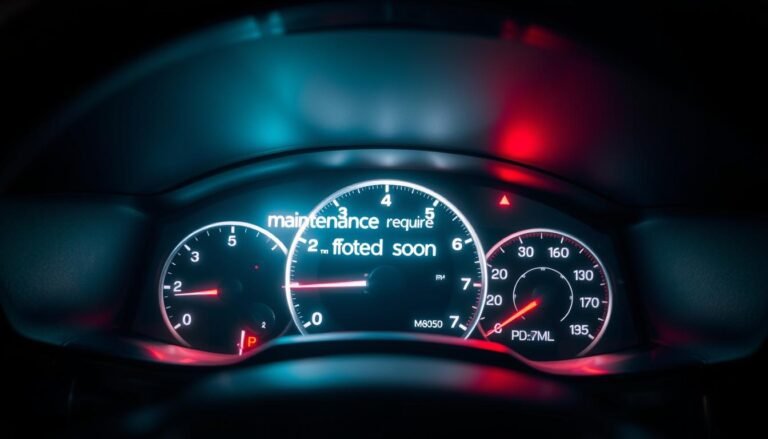How To Fix Braking Power Low Toyota Highlander? Exclusive 9 Idea
Is your Toyota Highlander’s braking power not as strong as it should be? This is a serious safety risk.
To fix this, you need to know how brakes work, see the warning signs, and understand common causes. This guide gives you the right steps to improve your car’s brakes.
First, look at key parts like worn brake pads or brake fluid leaks. These usually cause brake problems. If pushing the brake pedal feels off or spongy, it’s probably a big issue.
It’s smart to check your brake booster and fluid levels to know what to fix next. We’ll show you how to fix your Highlander’s weak brakes.
You’ll learn solutions and how to keep your brakes in good shape. Get ready to learn about your Toyota Highlander’s brakes and how to keep your car safe and running smoothly.
What is The Braking System of The Toyota Highlander?
The brake system in your Toyota Highlander is crucial for safe driving. Knowing how it works helps in maintaining your car and fixing problems.
Let’s look at the key parts of the braking system and how they function together for effective stopping.
Key Components of The Braking System
Several key parts make up the Toyota Highlander’s brake system, each with its own role:
- Brake Pedal: You press this to start the braking process.
- Brake Booster: This makes pushing the brake pedal easier by using vacuum pressure.
- Master Cylinder: It turns the pedal pressure into hydraulic force.
- Brake Lines: These pipes carry brake fluid from the master cylinder to the calipers.
- Brake Calipers: They press the brake pads onto the rotors, creating the friction needed to stop.
How The Braking System Functions?
The braking system of the Toyota Highlander works on a hydraulic principle. Here’s how it goes: When you hit the brake pedal, the booster helps to push brake fluid through the lines to the calipers.
Then, the brake pads squeeze the rotors. This action creates the friction that slows your car down.
Knowing how your braking system works is key to diagnosing problems and keeping your car running well. Being aware and checking your brakes regularly helps avoid accidents.
Common Symptoms of Low Braking Power
Learning the signs of low brake efficiency can make a big difference in your safety on the road.
Being able to spot problems early means you can fix them before they get worse. Here are the main symptoms to look out for:
Poor Responsiveness of The Brake Pedal
If pressing the brake pedal doesn’t feel right, it’s time to pay attention. A slow or weak response can signal issues with the brake booster or calipers.
This is a critical sign of brake issues you shouldn’t overlook.
Increased Stopping Distances
When your Toyota Highlander takes longer to stop, it’s a clear sign something’s wrong. It could mean your brake pads are worn out or there’s a leak in the brake system.
Keeping an eye on how quickly you can stop is key to avoiding danger.
Unusual Noises While Braking
Hearing grinding, squeaking, or any strange sounds when you brake? It’s likely that your brake parts are worn out and need a quick check.
Acting fast when you hear these noises is crucial for identifying problems with your brakes.
| Symptom | Possible Causes | Recommended Action |
|---|---|---|
| Poor Responsiveness | Brake booster issues, caliper malfunctions | Inspection and possible replacement |
| Increased Stopping Distance | Worn brake pads, brake fluid leaks | Check brake pads, refill or change brake fluid |
| Unusual Noises | Worn components | Immediate inspection by a professional |
Possible Causes of Low Braking Power in The Toyota Highlander
It’s important to know why your Toyota Highlander might have weak brakes. Many things can cause this problem. Recognizing these causes is key to fixing and preventing issues.
Worn Brake Pads and Their Impact
Old brake pads are a main reason for poor braking. They lose the ability to create friction which is needed for stopping.
This means you’ll need more distance to stop and the brakes won’t respond quickly.
The Role of Brake Fluid Leaks
Leaks in the brake fluid can really hurt your brakes. They lower the pressure which is needed to engage the brakes well.
Catching a leak early helps avoid worse problems and keeps brakes working right.
Malfunctioning Brake Calipers
Bad brake calipers also lead to weak braking. If they can’t press the brake rotors well, stopping your car takes longer. You need to fix this issue fast to drive safely.
ABS Sensor Issues
ABS sensor problems affect your car’s anti-lock brakes. A bad sensor makes braking uneven, which could cause skidding. It’s crucial to fix any sensor problems to keep your brakes safe.
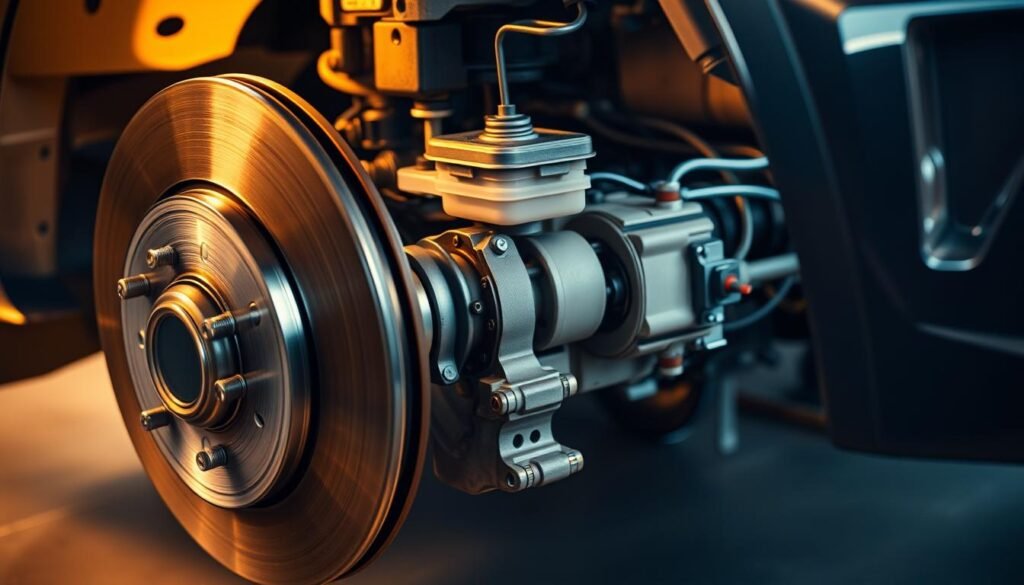
braking power low toyota highlander
If you see a “braking power low” message in your Toyota Highlander, you need to act fast.
Start by troubleshooting low braking power with diagnostics to find problems like bad sensors or brake system parts. This step is crucial for safety and to get things working right.
Check things carefully, including vacuum lines, brake fluid levels, and the brake booster’s work. Each plays a big part in how well your brakes work.
Keeping an eye on these can help a lot in fixing brake issues Highlander. Use these tips to check everything properly and fix the issue.
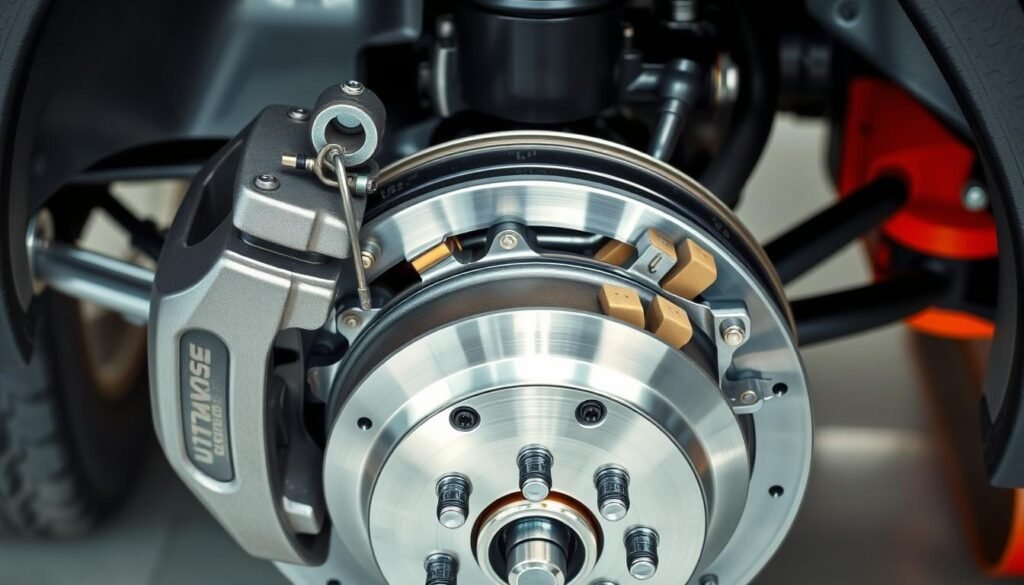
Step-by-Step Guide To Troubleshooting Brake Issues
To fix brake problems, you need to check each part carefully. Start by examining parts that could be causing issues. Follow this guide to learn how to spot and fix brake issues.
Inspecting Vacuum Lines
Start by looking at the vacuum lines going to the brake booster. Check for:
- Cracks or wear
- Disconnections or loose fittings
- Signs of fraying or damage
Problems here can make your brakes work poorly.
Checking Brake Fluid Levels
Next, make sure there’s enough brake fluid. Not having enough can mess up the brakes’ pressure. Here’s what you should do:
- Find the brake fluid container
- Check if the fluid is at the level it’s supposed to be
- Look for any fluid leaks around the container or brake lines
Keeping the right amount of fluid is crucial for your brakes to work well.
Evaluating The Brake Booster Performance
The final step is to check the brake booster. It makes pushing the brake pedal easier. To check it:
- Push the brake pedal when the engine is off; it should be hard
- Turn on the engine and press the pedal again; it should feel easier
- If it doesn’t change, the booster might need to be looked at
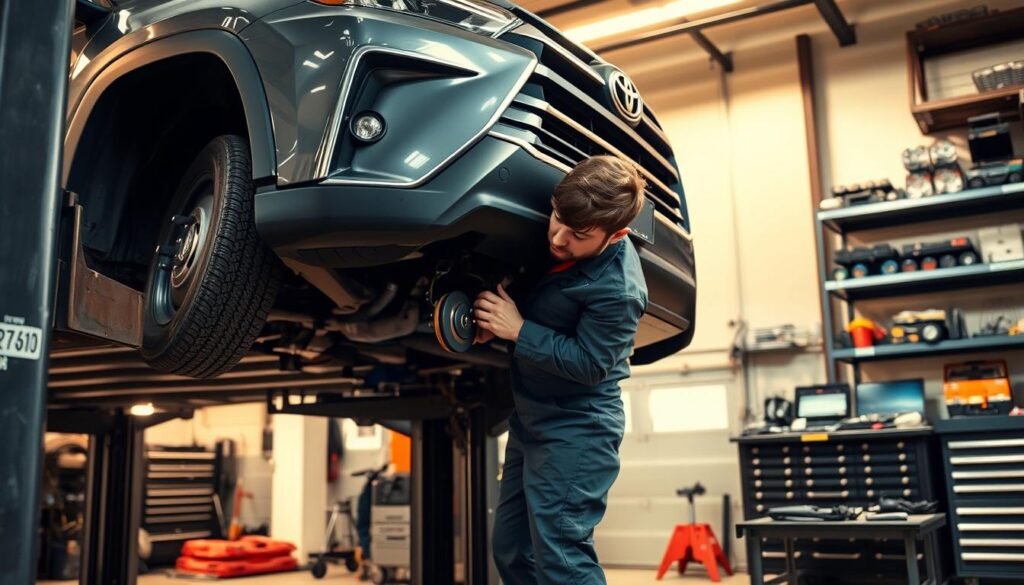
Reliable Fixes For Low Braking Power
To boost your braking power, there are a few key steps you can take. Each solution tackles the common problems many drivers encounter, making for safer trips.
Check out these tips to improve your Toyota Highlander’s brake performance.
Replacing Worn Brake Pads
Worn brake pads are bad for your car’s stopping power. It’s important to regularly inspect them and swap them out if they’re thin.
Here’s how you can change your brake pads:
- Lift the vehicle and remove the wheels.
- Take out the caliper to access the brake pads.
- Remove the old pads and put in new ones with care.
- Put the caliper and wheels back on.
Addressing Brake Fluid Leaks
Brake fluid leaks can weaken your brakes and lead to accidents. To fix leaks in your brake system:
- Look over the brake lines for any signs of wear or rust.
- Inspect the brake master cylinder and calipers for leaks.
- Find and replace the faulty parts.
- Refill the brake fluid to the right level after repairs.
Repairing or Replacing Brake Calipers
Bad brake calipers slown down your car’s stopping ability, so they may need fixing or replacing. Follow these steps to handle caliper problems:
- Remove the wheel to check the caliper for problems.
- If there’s damage, take the caliper out of the system.
- Put in a new caliper or fix the old one, making sure it works well.
- Put the wheel back on and test the brakes for safety.
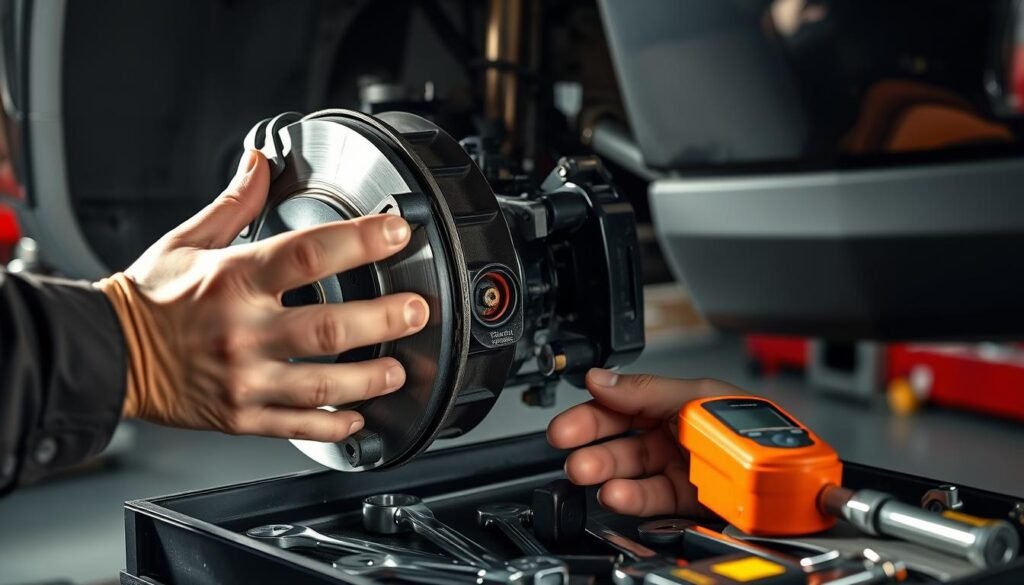
Preventive Maintenance For Your Toyota Highlander
To keep your brakes working well, it’s key to focus on maintenance. Doing this helps your car perform better and keeps you safe while driving.
Your plan should include checking your brakes, managing brake fluid, and keeping an eye on your brake pads. All these steps help your brakes work their best.
Regular Brake Inspections
It’s important to have your brakes checked regularly. This prevents small issues from getting bigger.
In these checks, technicians look at your brake pads, rotors, and fluid levels. Finding wear and tear early on can save money later.
Changing Brake Fluid
Keeping an eye on your brake fluid is very important. Over time, brake fluid can get water and dirt in it, which makes it work less well.
Changing your brake fluid regularly keeps the pressure right and improves braking when you really need it.
Monitoring Brake Pad Wear
Paying attention to how thin your brake pads are getting is crucial. Checking them often lets you know when it’s time for new ones.
Changing them before they get too worn helps your brakes last longer and prevents bigger problems like damage to the rotors.
Following these tips can help your brake system last longer, keeping you safe and your Toyota Highlander running smoothly.
Make these brake care steps a priority for a reliable braking experience.
Enhancing Braking Performance in Your Highlander
Making your Toyota Highlander stop better is key for both safety and performance. You can boost your Highlander’s braking power by choosing the right upgrades.
Two great ways are getting aftermarket brake parts and using high-performance brake pads.
Aftermarket Brake Upgrades
Aftermarket brake parts can cool down faster and stop your car quicker. They use better materials and designs than the original ones.
By upgrading your brake rotors and calipers, your brakes will perform better and last longer.
Utilizing High-Performance Brake Pads
High-performance pads give you more grip and shorter stops, which is great in tough spots.
They handle high heat well and keep working hard, making sure your Highlander stops when it should. Getting these pads will make braking more reliable and controlled.
Seeking Professional Assistance
If your Toyota Highlander’s brakes are still not working right after you’ve checked everything, see a mechanic.
They are experts at finding problems that are hard to spot. A skilled mechanic can make sure your car gets the right fix.
When To Consult A Mechanic
It’s important to know when to get help from an expert to keep your car safe. Here are signs you should see a mechanic:
- Persistent low braking power despite fluid checks and brake pad inspections.
- Unusual noises during braking that continue after basic adjustments.
- Inconsistent pedal feel when applying brakes.
- Warning lights on the dashboard, which could indicate serious brake system faults.
Learning Diagnostic Trouble Codes (DTCs)
Reading the DTCs from your car’s OBD-II system with a diagnostic tool is a big help.
These codes tell us exactly what’s wrong with the brakes. For example, they can show issues with parts like:
| DTC Code | Description |
|---|---|
| C0040 | ABS Sensor malfunction |
| P0501 | Vehicle Speed Sensor error |
| P0455 | Evaporative Emission Control System leak |
| U0121 | Lost Communication with ABS module |
Knowing these codes helps your mechanic figure out the brake problems better. Always ask for expert help when you need it. It saves time and keeps your car safe to drive.
Potential Recalls or Technical Service Bulletins
It’s key to keep up with possible Toyota Highlander recalls. This ensures your brakes are safe and work well.
Recalls are issued when widespread brake problems could put you at risk. By staying updated, you can fix issues fast and keep your Highlander in top shape.
Recalls Related to Braking Issues
Watching out for recalls affecting your Toyota Highlander’s brakes is vital. Recalls come up for many reasons, like safety risks with the brakes.
To keep informed, visit the Toyota website or talk to your local dealer. Technical service bulletins (TSBs) are also helpful for understanding common problems and solutions.
Using recall information and technical service bulletins helps you stay ahead of brake issues.
This is part of keeping your Highlander running well. Knowing about problems from recalls is important.
| Recall Type | Description | Year(s) Affected |
|---|---|---|
| Brake Issue Recall | Potential loss of braking performance under specific conditions. | 2013-2018 |
| Technical Service Bulletin | Guidelines for addressing brake fluid leaks or malfunctioning components. | 2015-2020 |
| Brake Issue Recall | Defective components affecting brake responsiveness. | 2010-2012 |
Conclusion
It’s key to fix low braking power in your Toyota Highlander for a safe drive. Knowing the braking system and spotting problems helps you fix issues quickly.
Regular check-ups and taking care of brakes are also important. Improving your car’s brake power can be done by changing old brake pads and fixing leaks.
Keeping an eye on your brakes helps stop problems before they get worse. This makes sure your Highlander stays dependable on the road.
To wrap it up, keeping your car maintained and fixing issues fast makes driving safer and more fun.
Being well-informed and acting early helps make your Highlander’s brakes work better for a long time.
FAQs
What are the common symptoms of low braking power in a Toyota Highlander?
You might notice the brake pedal doesn’t respond well. Your car may also take longer to stop. Plus, there could be grinding or squeaking sounds during braking.
What could cause low braking power in my Highlander?
Low braking power can come from worn brake pads or leaks in the brake fluid. Problems with brake calipers or ABS sensors are also common causes.
How can I troubleshoot low braking power in my Highlander?
Check for cracks in the vacuum lines first. Make sure your brake fluid is at the right level. Also, check the brake booster to see if it’s working right.
What are effective fixes for low braking power?
Changing old brake pads, fixing leaks in the brake fluid, and fixing or replacing bad brake calipers can help a lot.
How can I maintain my Highlander’s brake system to prevent low braking power issues?
Keeping up with brake inspections and changing the brake fluid regularly is key. Also, keep an eye on how your brake pads wear down.
What aftermarket upgrades can enhance brake performance in my Toyota Highlander?
Upgrading to high-performance brake pads and rotors can make a big difference. They’re better at stopping your car and dealing with heat, especially under heavy use.
When should I seek professional help for braking issues?
If you’ve tried simple fixes and still have problems, it’s time to see a mechanic. They can do a full check and make repairs.
How can I find out about potential recalls related to my Highlander’s braking system?
To learn about recalls or Technical Service Bulletins, visit Toyota’s website. You can also talk to your local dealer for the latest news on braking issues.

